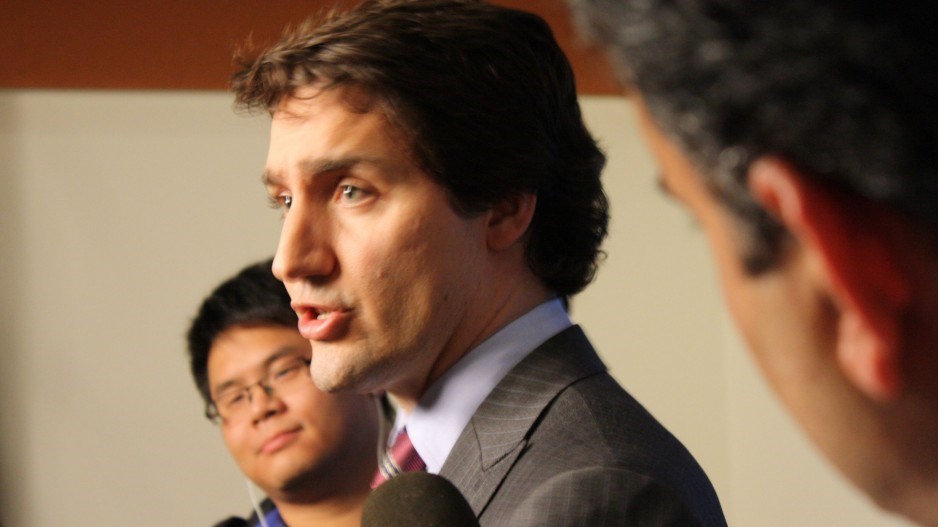Some politicians in Northeast British Columbia are saying even a temporary halt to fracking could have dire effects on the region that one of the front-runners in the 2015 prime minister’s race may not have fully considered, based on recent comments.
At a stop in New Brunswick last week, Liberal Party of Canada leader Justin Trudeau said more scientific study is required before Canada expands natural gas exploration and drilling.
“In terms of fracking and shale gas, we need to make sure that we have all the information, that there is proper science done,” Trudeau said. “That’s why we need to make sure that we’re strong on both the science and the long-term vision ... before we move ahead with that.”
But comments from the man who many polls say could unseat Prime Minister Stephen Harper have politicians in B.C.’s gas country firing back.
Northern Rockies Regional Municipality Mayor Bill Streeper condemned Trudeau’s statements, saying the Liberal leader was ill-informed.
“He has no idea about the oil patch at all,” he said. “To say that we need to study fracking more shows the ignorance that comes out of the East and the West.”
Streeper was also pessimistic about the future of northern B.C. if the Federal government were to order a stop on shale gas exploration for further study.
He also compared Trudeau’s recent statements to the National Energy Program introduced by his father, Pierre Trudeau. The program, while intended to promote energy independence, was reviled in Western Canada because it aimed to keep domestic oil prices below world prices.
“So like father, like son,” Streeper said.
Conservative Senator Richard Neufeld, who represents the Northeast, said any slowdown of natural gas development “would devastate us,” saying natural gas production “is what makes Northeast B.C. tick.”
A study released in November more than doubled the amount of natural gas thought to be trapped in the Montney formation that straddles B.C. and Alberta. It was the first assessment of its kind for the region and estimated that the field can support commercial gas drilling activity for 150 years or longer. The volume of marketable gas is now believed to be 12.7 trillion cubic metres, which is roughly the volume of Lake Superior.
“The government does the right thing, and continues to do the right thing when it comes to researching fracking,” said Neufeld, who added that B.C. leads Canada in unconventional natural gas production.
There are currently 19 gas projects in various stages of development in B.C., two of which would transport natural gas produced in British Columbia and Alberta to Oregon, where it would be liquefied and shipped to markets in Asia. The other 17 would be based up and down B.C.’s Pacific coast.
The opening of just five LNG plants by 2021 would create more than 60,000 jobs at peak construction, estimated the Grant Thornton LNG Employment Impact Review. The report also estimated that another 75,000 jobs will be created after the five LNG projects are fully operational.
That’s one of the reasons Dawson Creek Mayor Dale Bumstead said that he was opposed to shutting or slowing down the fracking industry to study the issue.
“I absolutely want it done safely,” he said. “[But] I haven’t seen anything to the contrary, where it’s causing this kind of issue.”
Bumstead also praised the existing regulations of the B.C. Oil and Gas Commission, and said that slowing resource development would cut funds for healthcare and education.
“We have to stop saying no to everything,” he said. “We all want more in terms of our social programs.”
Some studies appear to back up Trudeau’s point, like one commissioned by Environment Canada and released earlier this year, which stated “data about [fracking’s] potential environmental impacts are neither sufficient nor conclusive.”
“There is reason to believe that shale gas development poses a risk to water resources, but the extent of that risk and whether substantial damage has already occurred, cannot be assessed because of a lack of scientific data and understanding,” the report concludes.
When asked for comment, Fort St. John Mayor Lori Ackerman said in an emailed statement that she supported further research.
“Canada is a resource nation and our resources support the development of our knowledge economy,” she wrote. “We know that investment in research and development can make resource industries safer, more efficient, effective and leave a lighter footprint. I believe that R&D is where we should be putting the focus.”
But Prince George-Peace River MP Bob Zimmer said that Trudeau “needs to understand the science of hydraulic fracking and the LNG and also oil and gas industry as a whole and understand that it is safe.”
“There has been no issue of water contamination in B.C.’s history, not to mention across the continent,” he added. “There have been stories and innuendo, but they’ve been found baseless.”
Zimmer said that a moratorium would be “catastrophic” for northern B.C.
“Even a slowdown wouldn’t be a good thing for British Columbians or Canadians. It wouldn’t be good for anybody,” he said. “I just wish he would do more research before he makes comments like that.”
Trudeau’s office did not return phone calls seeking comment.




